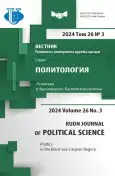The Evolution of the Political Development of the Republic of Kazakhstan in the Post-Soviet Period
- Autores: Mamedov A.V.1
-
Afiliações:
- Diplomatic Academy of the Russian Foreign Ministry
- Edição: Volume 26, Nº 3 (2024): Politics in the Black Sea-Caspian Region
- Páginas: 520-530
- Seção: THE CASPIAN REGION AND THE CAUCASUS: SECURITY AND DEVELOPMENT
- URL: https://journal-vniispk.ru/2313-1438/article/view/322420
- DOI: https://doi.org/10.22363/2313-1438-2024-26-3-520-530
- EDN: https://elibrary.ru/BCEWEF
- ID: 322420
Citar
Texto integral
Resumo
Kazakhstan’s experience holds a special place among the Central Asian states. The process of democratization and the authoritarian rollback and return to democratic tracks that replaced it reflects the specifics of the Kazakh political system. Meanwhile, Kazakhstan, as well as other Central Asian states, was influenced by historically established methods of governance and the relationship between different power groups. As a result, despite the declared principles of separation of powers, Kazakhstan was dominated by the institution of the first president. The article concludes that the consolidation of the vertical of executive power at the first stage allowed to stabilize the economic situation and to pursue a balanced foreign policy course, as well as to reduce the influence of regional elites. However, the consolidation of power by the president led to instability of the political sphere, as the mechanism of power transfer was not developed. The irremovability of political elites and the reduced role of parliament in making key decisions on the development of the state have created obstacles to the introduction of truly democratic norms. Moreover, the artificial construction of the political system, where the Security Council of Kazakhstan received the status of a constitutional body, laid the foundation for the conflict between the First President and K.J. Tokayev, who won the early elections in 2019. The arrival of Tokayev to the highest state post opened a new stage of political development of the country. The article concludes that despite the elimination of dual power and the constitutional reform of 2022, the political development of Kazakhstan has not undergone serious changes.
Palavras-chave
Sobre autores
Alexey Mamedov
Diplomatic Academy of the Russian Foreign Ministry
Autor responsável pela correspondência
Email: alex.mamedo@yandex.ru
ORCID ID: 0009-0002-7890-8943
postgraduate of the Department of Political Science and Political Philosophy
Moscow, RussiaBibliografia
- Aleksandrov, Yu.G. (2013). Kazakhstan in the face of the barrier of modernization. Moscow: Institute of Oriental Studies of the Russian Academy of Sciences. (In Russian).
- Furman, D.E. (2006). Evolution of Political Systems of the CIS Countries. In N.P. Shmelev, V.A. Guseynov & A.D. Yazkova (Eds.), Mediterranean — Black Sea — Caspian: Between Greater Europe and the Greater Middle East (pp. 125–150). Moscow: Granitsa. (In Russian).
- Ionova, E. (2022). Kazakhstan on the path of reforms. Russia and the New States of Eurasia, (4), 99–111. (In Russian).
- Karpovich, O.G. (2019). Conceptual foundations of political modernization in Kazakhstan. PostSoviet Studies, 4, 409–416. (In Russian) https://doi.org/10.24975/2313-8920-2019-6-4-409-416
- Karsakov, M. (1998). Features of the transformation of the political system of Kazakhstan in the late 80s — mid 90s. Central Asia, (14), 45–65. (In Russian).
- Khadyrov, R.Yu. (2016). Features of the political system of Tajikistan. Post-Soviet Studies, 2, 104–111. (In Russian).
- Kurtov, A. (2001). Electoral democracy in Kazakhstan: Authoritarian transformation. Moscow, Asti-izdat. (In Russian).
- Luzanova, E. (1997). International seminar “Political development of Central Asia and Central Europe: Similarities, differences, and paths of cooperation”. Central Asia, (10), 78–86. (In Russian).
- Seidumanov, A.S. (2022). Features of Kazakhstan’s democratic transit model: Conceptual and methodological analysis. Post-Soviet Studies, 9(4), 423–436. (In Russian) https://doi.org/10.24975/2313-8920-2022-9-4-423-436
- Seylekhanov, E.T. (2009). Political system of the Republic of Kazakhstan: Development experience and prospects. Almaty: KISI. (In Russian).
- Shkel, S. (2009). Features of the political regime in modern Kazakhstan and prospects for its transformation. Central Asia and the Caucasus, (6), 115–122. (In Russian).
- Sultanov, B.K. (Ed.). (2010). Central Asia: 1991–2009. Almaty: KISI. (In Russian).
- Sultanov, B.K. (Ed.). (2011). Kazakhstan: 20 Years of Independence. Almaty, KISI. (In Russian).
- Sultanov, B.K. (Ed.). (2012). Central Asia and the Caspian region: Risks, challenges, threats. Almaty: KISI. (In Russian).
- Syroezhkin, K.L. (Ed.). (2011). Central Asia today: Challenges and threats. Almaty: KISI. (In Russian).
- Tuleshov, V. (2017). On the formation and development of identity in Kazakhstan and Central Asia. In M. Laruelle & A. Kurmanova (Eds.), Central Asia-25: Thoughts on the past, projection of the future (pp. 36–38). Washington: Institute for European and Russian Studies, George Washington University. (In Russian).
- Zhiltsov, S.S. (2016). Political processes in Central Asia: Peculiarities, problems, prospects. Central Asia and the Caucasus, 17(1), 21–29.
- Zhiltsov, S. (2005). Revolutionary waves in the Post-Soviet expanse. Central Asia and the Caucasus, (6), 7–13. (In Russian).
- Zhiltsov, S., & Zonn, I. (2019). Political development of Kazakhstan: Results and prospects. Central Asia and the Caucasus, 22(4), 67–76. (In Russian).
- Zhiltsov, S.S., Slizovsky, D., Shulenina, N., & Markova, E. (2018). Formation of national identity in the countries of Central Asia: Results, problems, prospects. Central Asia and the Caucasus, 21(1), 40–54. (In Russian).
Arquivos suplementares









